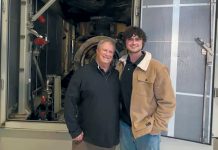
In this final series, I speak with Jason Borgen, the Chief Technology Innovation Officer at the Santa Cruz Office of Education (SCCOE), and with two local businesses, BraLisa and The Gather Community.
In this concluding segment of our three-part series on AI in Small Town America, we continue exploring the impact of AI technology on our community. In Parts 1 and 2, we introduced the concept of AI, highlighted critical players in our country, and discussed how AI might affect our lives.
Now, we delve into the perspectives of local business owners and educational leaders, examining how AI is integrating into our daily routines and the concerns that arise from its usage.
Local Insights
At a recent gathering of the Valley Women’s Mixer event in Scotts Valley, I had the privilege of conversing with two influential business owners. They candidly shared their experiences and concerns regarding the use of AI.
Lisa Bunion, Ph.D., CEO of BraLisa (BraLisa.com), a “women-owned and women-sewn business specializing in providing unmatched comfort and support for women recovering from breast surgery, as well as those seeking everyday comfort,” discussed her journey with AI.
Lisa has been utilizing AI platforms, such as ChatGPT, Hemingway and Wordstream, for over six months to enhance various aspects of her business. She emphasized her concern about students increasingly relying on AI for tasks like writing essays, potentially diminishing their critical thinking and creativity.
Lisa stated, “Students are turning to AI instead of using their own brains and skills to write essays.”
Tracie Root is a business coach, speaker, author and founder of The Gather Community (tr****@********ot.com). She “guides women entrepreneurs to be BOLD in their business with a clear strategy, authentic sales, and connected community.”
Tracie spoke about her AI usage, including ChatGPT and TicToc, along with her engagement with Alexa, another AI-based product. She pointed out the potential for nefarious use, particularly in manipulating images and creating fake content that can misrepresent prominent figures.
Tracie said, “The nefarious use of faking images, like the SAG-AFTRA strike and faking what prominent people in power are saying to make it look like they said things they didn’t,” is concerning.
Addressing AI Concerns
It’s crucial to address these valid concerns about AI in our community. In the previous installment, I attended the second AI Horizons event organized by Santa Cruz Works, where I reported on the vibrant discussions.
While AI offers significant potential, it also raises legitimate fears about job displacement, technological shortcomings, and the prospect of AI becoming sentient and dominating our world.
To delve deeper into educational concerns, I reached out to Jason Borgen, the Chief Technology Innovation Officer at the Santa Cruz Office of Education (SCCOE) (santacruzcoe.org/tech/).
Jason’s role involves advocacy and community engagement, overseeing the technology infrastructure for local school districts, and providing Internet services to 10 districts in our county. With a background in educational leadership and administration, Jason’s expertise is instrumental in shaping education in the AI era.
The SCCOE’s mission revolves around embracing new trends in pedagogy and leveraging technology to enhance student engagement and success while preparing them for future careers.
Recognizing the importance of addressing concerns related to the ethical use of AI-generated information and its impact on teachers, the SCCOE is actively working to transform teaching methods and assessments.
This transformation includes integrating digital literacy and helping students navigate the vast online information landscape. Furthermore, systems are in place to identify AI-generated content, ensuring its responsible use.
In Capable Hands
My concerns about students over-relying on AI for writing assignments found resonance with Jason Borgen and the SCCOE (santacruzcoe.org). Evidently, they are proactively addressing these concerns and are committed to ensuring that AI serves as a complement, rather than a replacement, for traditional education.
Jason shared valuable insight and information with these two specific resources, reports by UNESCO (United Nations Educational, Scientific and Cultural Organization) and the Center for Innovation and Teaching Learning, reassuring insights into AI’s role in education and how SCCOE is handling our student’s educational future.
Visit https://tntech.edu/citl/pdf/spring-2023/2-28-2023-ai-presentation.pdf and https://cenic.org/network for more information.
In Summary
AI is reshaping various facets of our lives, from healthcare and finance to media and warfare. In our daily work, we outsource routine writing tasks, enhance our creativity, and incorporate AI into art, music, and home automation. The AI genie is out of the bottle and is here to stay.
We must remain well-informed, actively engaged, and vigilant as we navigate this AI-driven world. The potential benefits are vast, but so are the risks.
By collaborating, educating ourselves, and harnessing AI’s power responsibly, we can ensure a brighter future for Small Town America in the age of artificial intelligence.
Janet Janssen is a Life in Business coach, public speaker and trainer, as well as a Leadership Santa Cruz County board member, Distinguished Toastmaster and SLV/SV Chamber member. Contact her at ja***@**********en.com or go to janetjanssen.com.











